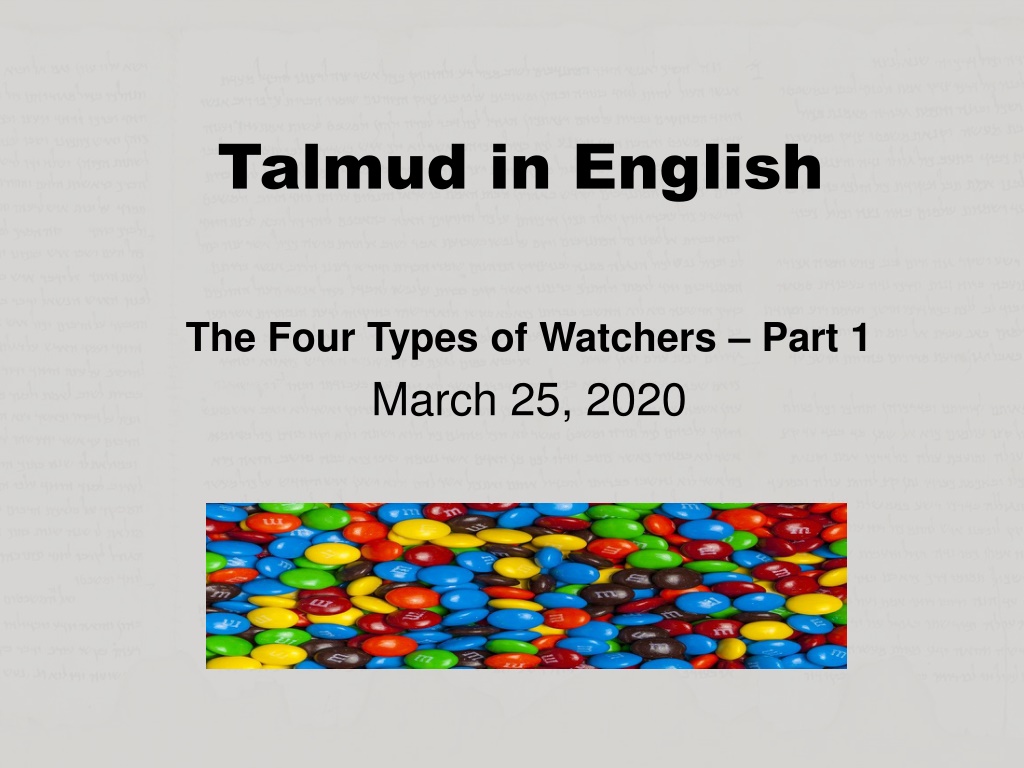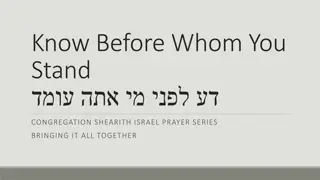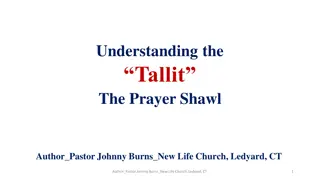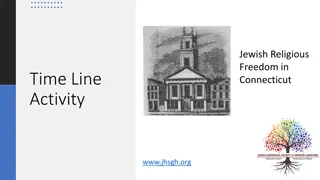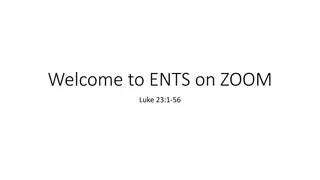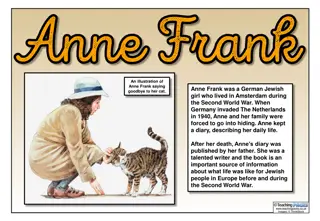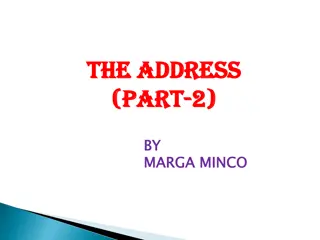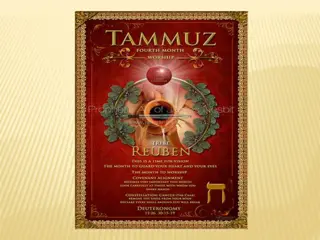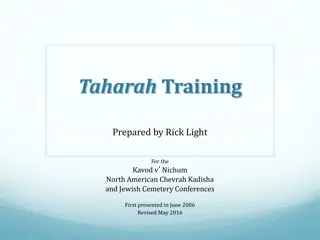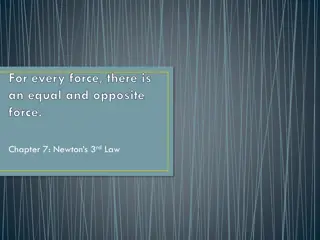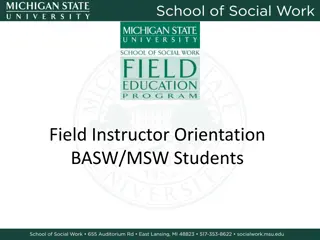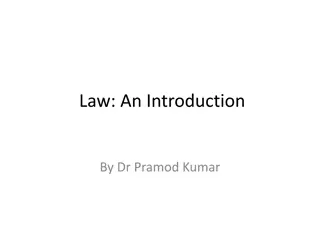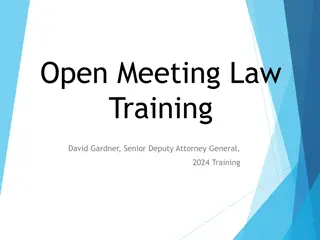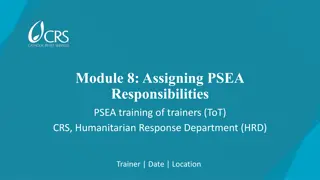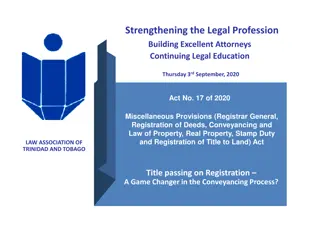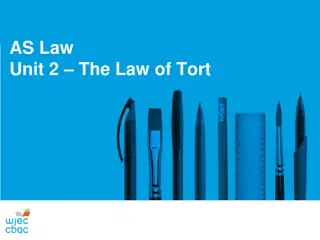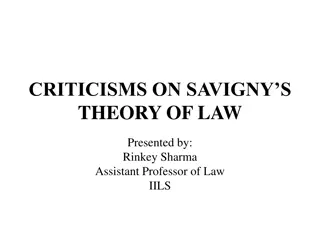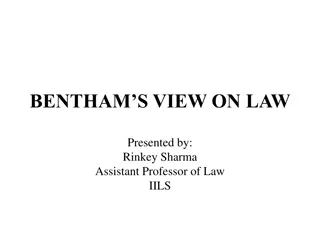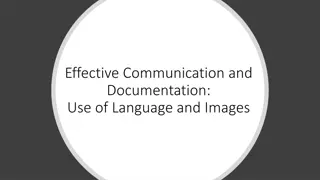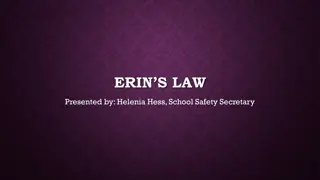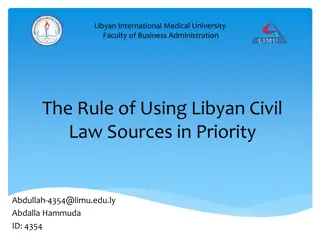Understanding the Responsibilities of Watchmen in Jewish Law
Explore the concept of watchmen in Jewish law as outlined in the Talmudic texts, discussing the different types of watchers, their responsibilities, and the legal implications when something goes wrong under their watch. Delve into scenarios, Biblical references, Mishnah teachings, and Rambam's rulings on the subject.
Download Presentation

Please find below an Image/Link to download the presentation.
The content on the website is provided AS IS for your information and personal use only. It may not be sold, licensed, or shared on other websites without obtaining consent from the author. Download presentation by click this link. If you encounter any issues during the download, it is possible that the publisher has removed the file from their server.
E N D
Presentation Transcript
Talmud in English The Four Types of Watchers Part 1 March 25, 2020
Seder Nezikin (Damages) 10 Tractates (Masechtot) Bava Kamma, Bava Metzia, Bava Batra Torts - a wrongful act or an infringement of a right leading to legal liability Who s responsible when there is a watchman and something bad happens?
Shomer to watch Shomer: Watcher, Guardian, Bailee Shomrim Orthodox neighborhood watch groups Shomrim name of the fraternal order of Jewish police officers Shemira - the Jewish custom of watching over a dead body before burial Shmurah matzah watched matzah to make sure it s kosher for Passover
Exodus 22:6-8 6 When a man gives money or goods to another for safekeeping and they are stolen from the man s house if the thief is caught, he shall pay double; 7 if the thief is not caught, the owner of the house shall depose before God that he has not laid hands on the other s property. 8 In all charges of misappropriation pertaining to an ox, an ass, a sheep, a garment, or any other loss, whereof one party alleges, This is it the case of both parties shall come before God: he whom God declares guilty shall pay double to the other.
Mishnah Bava Metzia 7:8 There are four types of watchmen: 1) the unpaid watchman (shomer chinam) 2) the borrower (shoel) 3) the paid watchman (shomer sachar or noseh sachar) 4) the renter (sachar) the unpaid watchman takes an oath over everything the borrower pays for all the paid watchman and the renter take oaths on broken, taken captive, or died, and pay for a loss or theft.
Rambam, Mishneh Torah Hilchot Sh eilah Ufikadon 4:2 Since the Torah absolved an unpaid guardian from theft, he is certainly absolved from losses that are even more beyond his control, such as if [the animal he was watching] was broken, or was taken captive or died.
Rashi, Bava Metzia 95a An unpaid guardian where liability for negligence is mentioned in the Torah: For all cases of crime.
3 More Scenarios: 1 Exodus 22:10 An oath before the LORD shall decide between the two of them that the one has not laid hands on the property of the other; the owner must acquiesce, and no restitution shall be made.
3 More Scenarios: 2 Shulchan Aruch, Choshen Mishpat 295:2 Thus, every guard who swore the guard s oath that includes three things in his oath: that he kept guard in the guard s manner and that it happened this way; that it is not in his possession; and that he did not illegally use it before the event happened.
3 More Scenarios: 3 Shulchan Aruch, Choshen Mishpat 12:2 It is a religious duty to say to the litigants at the outset, 'Do you wish [to resort to] law or [to submit to] arbitration?' If they consented [to submit to] arbitration, they bring about a settlement between them.
Mishnah Bava Metzia 6:6 If one says to another, Watch this for me, and the other responds, Place it down in front of me, he becomes an unpaid watchman.
BT Bava Metzia 81b Rav Huna said: One who responded, Place them down before yourself, becomes neither an unpaid nor a paid watchman. The following question was asked by the rabbis: What if he simply responded, Put it down ? Rav Huna said: If he said to him: Place it down before yourself , he is neither an unpaid bailee nor a paid bailee, and he has no responsibility at all. A dilemma was raised before the Rabbis: If he said simply: Place it down , without specifying further, what is the halakha? Come and hear: If one says: Safeguard my property for me , and the other says to him: Place it before me, he is an unpaid bailee . This indicates that an unspecified statement is nothing.
Shulchan Aruch, Choshen Mishpat 291:2 A Shomer Chinam is one who is deposited money or vessels or animals or anything else to watch and he receives upon him to watch; and even if he did receive it by mouth, rather he says to him Place it before me he is a shomer chinam. But if he said to him Place it before you or Put it down or he said to him Your house is in front of you he is not a shomer chinam and does not have to take any oath.
Leviticus 25:14 - -- , - - , When you sell property to your neighbor, or buy any from your neighbor, you shall not wrong one another.
BT Bava Metzia 46b Whatever is assessed as the value of another object, as soon as one party takes possession thereof, the other assumes liability for what is given in exchange
BT Bava Metzia 47b Reish Lakish says: pulling is explicit in the Torah. What is the reason for the opinion of Reish Lakish? He derives it from the Torah, as the verse states: And if you sell to your colleague an item that is sold, or acquire from your colleague s hand, you shall not exploit his brother (Leviticus 25:14): an item that is acquired from hand to hand.
BT Bava Metzia 99a Rabbi Elazar said: Just as they decreed pulling for purchasers, so too they decreed it for watchmen.
BT Rashi on Bava Kamma 79a The Sages decreed that pulling is required for watchmen The watchman does not assume responsibility to safeguard the object until he pulls it.
BT Tosafot on Bava Metzia 99a For an unpaid watchman becomes liable for negligence without pulling the object; that [merely saying] Place it before me gives one the status of shomer chinam. The same is true of a paid watchman becoming liable for theft or loss.
Shulchan Aruch, Choshen Mishpat 291:5 There is an opinion that says that as soon as this watchman (the unpaid guardian) agrees to watch the object or has said, Place it before me thereby causing the owner to stop watching it himself he is liable for it if he was negligent, even though he did not pull it. There is also an opinion that says that he is not liable until he pulls the object, providing that he pulls it in a place where pulling effects a transaction.
